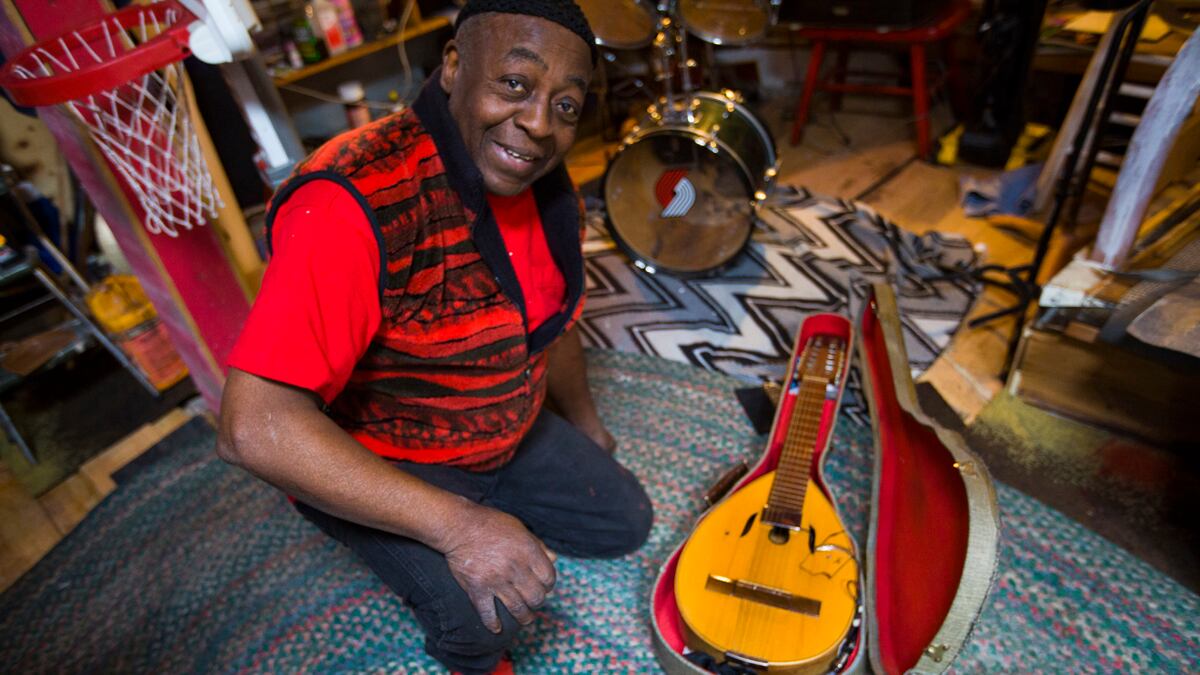Soul singer Ural Thomas has played the Apollo, shared stages with James Brown and Otis Redding, and negotiated contracts with some of the biggest record companies in the world.
But for any musicologist looking to excavate his life's story, the place to start is his ramshackle practice room on North Michigan Avenue—because really, it's all right here.
Admittedly, it's a bit of a mess right now. Buckets are overflowing with rainwater leaking from the ceiling, and to say it's "drafty" is like calling a hurricane "windy."
Even in better days, the House of Entertainment, as he's long called it, resembles a particularly chaotic junk shop, cluttered with ancient recording equipment, rehabbed instruments and random Goodwill finds.
But for Thomas, 80, the room behind the house where he and his wife, Rosie, have lived for five decades is more than a storage shed. It was his refuge when his career didn't go as planned—and where he eventually started his second act.
In the 1970s, after getting put through the wringer of the music industry, Thomas returned to the neighborhood where he grew up, dejected but not defeated, and built himself a rehearsal space using wood snagged from a lumber mill down the road.
"Kids would start coming in and saying, 'Can we just listen?'" he says. "Then they started playing."
Thomas began hosting weekly Sunday jam sessions, opening the sliding glass door off the alleyway to anyone who wanted to join in. One week, Portland musician Scott Magee poked his head in and asked Thomas if he might be interested in playing some of his old songs with a new band.
Within a year, Ural Thomas and the Pain were selling out gigs all over town, topping WW's Best New Band poll and releasing authentically vintage-sounding recordings of tunes Thomas wrote decades earlier.
Since the band started taking up more of his time, and his local profile increased, Thomas has had to suspend the public jams. But when the weather lets up, he's aiming to fix up the room and get them going again.
"It's not about getting rich," he says. "It's about showing people you can do anything."
12-string guitar
Like a lot of what you'll find in the House of Entertainment, Thomas rescued this lute-shaped 12-string guitar from the trash, in this case a dumpster on North Flint Avenue near Ex Novo Brewing. "It's really old," he says. "I don't know how old." It only had two strings when he found it, but he liked the sound enough that he added pickups and replaced the broken tuning pegs. He played a few solo shows with it prior to forming the Pain, but has barely taken it from its case—which he also found and repaired.
Metal Faces

If Thomas didn't find it and fix it, then it was probably a gift—if not from his family, then from an admirer or someone in the neighborhood. These metal faces, representing James Brown, Whitney Houston, Stevie Wonder and others hanging from a corner of the room, were given to him at a gig by a longtime fan. "He said, 'The spirit told me to give these to you. I've been trying to get them to you for years,'" he says. "I asked what he wanted for them, and he says, 'I'm not supposed to take anything for them—but maybe one day I can make one of you.'"
Ludwig Drum Set

Thomas bought the set from a church in deep East Portland for $500. When Magee first dropped by the House of Entertainment to recruit Thomas, this was the set he played. "He came to the back and said, 'Eric [Isaacson of Mississippi Records] told me you guys have jam sessions,'" Thomas recalls. "He said, 'I play drums,' and I go, 'Here.'"
Keyboards

The Yamaha was a gift from a late friend from Seattle. "This is all we had left together," Thomas says. The Hammond organ, meanwhile, has yet to be used live or on record, but that might change as soon as Thomas finishes building his own makeshift Leslie speaker—the amplifier commonly associated with the instrument.
Ural Thomas and the Pain Spring Highlight:
Concert at the Goodfoot, March 2
Willamette Week's Spring Arts Guide 2020
In Eyrst's Studio, Local Rappers Pull All-Nighters, and There's Artwork by the Nirvana Baby

